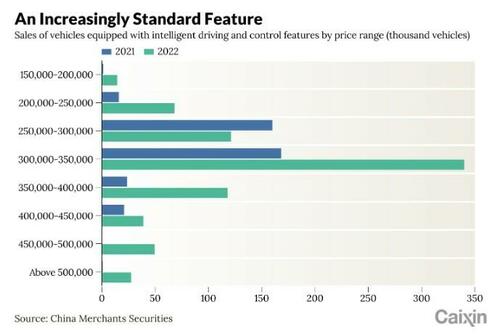The bad news keep stacking up for Tesla. This week it was announced the company was shuttering production at its Berlin plant and that Hertz, who once made headlines for massive EV purchases for its fleet, was selling much of its used EV fleet to re-adopt traditional ICE vehicles.
To cap off the week, Caixin also wrote about how Huawei is now aiming to pull ahead of Tesla in the race for autonomous vehicles.
As the report notes, the pursuit of self-driving car technology is intensifying, with numerous players vying for a share in a potentially huge market. Huawei has joined the fray, announcing a venture focused on intelligent car systems and components, including a high-end electric SUV, aspiring to lead in intelligent driving.
Leading the charge is Tesla Inc., among other global carmakers, startups, and tech giants, all competing in the world's largest auto market. Wu Gansha, co-founder and CEO of Uisee Technology Ltd., a driverless solutions startup, likened intelligent driving to the "pearl in the crown," with a potential revenue of a trillion yuan, at a recent forum.
Autonomous vehicles have been in development since March 2004, Caixin notes, starting with DARPA's $1 million challenge where 15 robotic vehicles attempted to navigate 142 miles of difficult California terrain, but none succeeded. Nearly two decades later, the vision of driverless cars remains somewhat futuristic, yet the commercial potential is too significant to overlook.
According to the report, by 2030, China could lead the global market for autonomous vehicles, with sales projected at $230 billion. Huawei's entry intensifies competition, as success in the sector hinges on data, computing power, and significant resources.
While developers struggle to balance cost, performance, and safety, creating unique products is challenging. The industry is expected to consolidate, akin to the dominance of iOS and Android in mobile operating systems.
As the race escalates, companies face a choice: develop autonomous technology independently or collaborate. Initially, many, like SAIC Motor Corp., opted for in-house development. However, the high costs and technical demands have led others, such as Volkswagen AG, to reconsider.
Huawei's dual expertise in software and hardware, including smart driving chips and sensors, positions it well for partnerships, offering a viable R&D platform for carmakers lacking resources. This trend toward collaboration reflects the industry's shifting dynamics and the growing importance of alliances in achieving autonomous driving advancements.
So while Tesla is looking out for BYD in one rear-view mirror, they'll have to be checking the other for Huawei...
